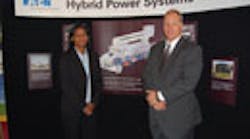WASHINGTON D.C. If there's one thing hybrid vehicle component manufacturers are trying to convey to the trucking market today, it's that hybrids should no longer be considered "concept vehicles" or "experimental."
It's here-and-now technology that can step right into a multiple of fleet applications and quickly start reducing emissions, saving fuel, and offering vehicle life cycle savings – all without sacrificing any expectations in terms of truck performance and capability, they say.
And that's the message Eaton Corp. especially wants to convey to members of Congress, which is why the OEM supported and participated in a special outreach event sponsored last week on Capitol Hill by the industry advocacy group Diesel Technology Forum (DTF).
"The trucking industry, the public, and members of Congress need to be aware that hybrid technology is available now; that it can help address emissions and energy security concerns now," said Dontia Warren, NAFTA medium-duty market development and strategy manger for Eaton's light and medium duty transmission business. "It's not a concept that may take years to develop. It's technology that's already hard at work with fleets today."
Warren told FleetOwner that Eaton's diesel-electric hybrid powertrain is currently operating in 14 different fleet applications, from utility bucket trucks operated by companies such as Pepco and Florida Power & Light, express delivery vehicles at United Parcel Service and FedEx, even urban pickup and delivery trucks run by the charity group City Harvest in New York City.
"Diesel is just not a 'dirty' fuel any more – it's green and still more efficient," Warren pointed out. "There's a growing desire by many companies to be more environmentally responsible, but these hybrid trucks are also more economically responsible in the long run. They save on fuel – with 11% better fuel economy than a comparable gasoline-powered truck – and reduce wear-and-tear on brakes and engines, generating additional cost savings."
Meeting those core "value drivers" of fleets, she stressed – being "green" while simultaneously generating costs savings – is what's going to really cement the hybrid truck's place in the trucking business in the near term.
"We think that fleets believe those 'value drivers' are being met by hybrids, because now we're starting to see repeat orders for them." Warren said.
In the two and half years since Eaton's diesel-electric hybrid truck powertrain went into full production with truck OEMs such as Navistar, the technology has accumulated 14 million miles of on-road service time, and the feedback from customers is extremely favorable, she noted. "The repeat orders are the proof that fleets themselves see the value in the [diesel-electric] hybrid truck; that they believe it works," Warren added.



